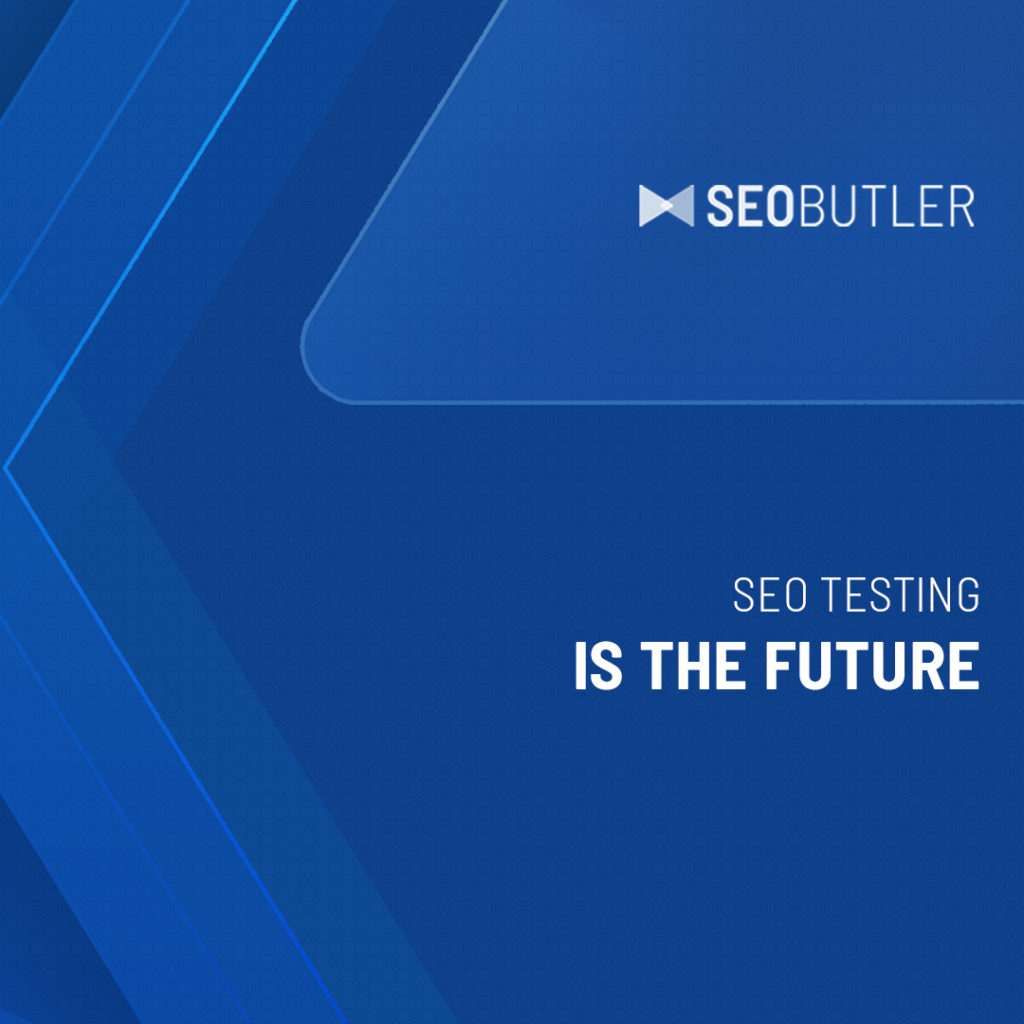SEO Testing Is the Future


What will our industry look like over the next five or ten years?
I spend a lot of my time thinking about SEO — from the moment I wake up to well past the time I should be asleep.
I think about SEO while showering, eating, watching a Liverpool match, pretending to listen to my wife, playing with my son, and while I’m actually working on SEO.
When I’m not thinking about SEO or talking about SEO or implementing SEO, I am testing my theories about SEO.
SEO testing is one of the most important aspects of my job.
More than that, I truly believe SEO testing is essential for the industry as a whole.
I foresee and hope that those who’ll make the greatest impact in SEO in the near future are the people who are testing.
In other words, I predict that those conducting scientific tests will compile the most accurate data, get the best clients, and become powerful influencers.
The Cruel Tutelage of SEO Mystics
You may be wondering how I got interested in testing and why I am so passionate about it.
In all honesty — and like most things in life — it was out of necessity.
Back in 2013, my brother and I were running our own design and development agency and made the fateful decision to open an office in India.
Much to our surprise, the local authorities were not so keen on our presence. They swiftly and forcefully kicked us out of the country.
To add insult to injury, we still had clients to service and no additional staff to help with the workload. The decision was made to dissolve the company and split up the clients. My brother had no interest in SEO, so I was left with those clients.
Unfortunately for them — and myself — I had no formal training in SEO.
In order to pay the rent and put food on the table, I had to learn real quick.
Fortunately, I am very good at research (hey, I even took an advanced class on it in law school.)
So, I was able to find a boatload of advice on what you must and must not do to rank higher in Google.
After implementing these strategies with mixed results, it occurred to me that the “experts” touting them couldn’t explain why they worked.
I asked myself, “Are these teachings based on nothing more than theory or supposition? Is there no way to find out how Google really ranks sites?”
Then — an epiphany.
Google isn’t a person, or persons, sitting in a room looking at every website in existence and subjectively choosing which are the most deserving of a first-page mention.
Google uses an algorithm.
And that algorithm is most likely predictable.
If that’s the case, thought I, then surely there is a way to figure out how it works.
But how?
The answer was (and continues to be) testing.
I wanted to find out if, by using the basic principles of the scientific method, I could run experiments to determine which factors directly affected rank.
I started by looking at those pages which were ranking on the first page and tried to find commonalities. Then I ran single variable tests to confirm my suppositions.
After a period of rigorous testing, I was able to map out a clearer picture of the strongest ranking signals.
My testing continues to this day, and I use the knowledge gleaned from those tests as the basis of my SEO practice.
What I’ve Learned From Testing
Over the past five years, I have conducted more than 350 tests on Google’s algorithm. As a result, I have made some pretty interesting discoveries.
Here are five things I have learned as a result of my own testing:
- Google can’t read.
- Grammar, spelling, bad words, and reading level are not ranking factors.
- Google can’t see a webpage – it doesn’t matter how pretty the page is, which fonts or colors you use, you must optimize specific factor areas.
- Contextual terms (or whatever label you want to call them) are a ranking factor.
- Click depth and the placement of internal links are factors.
Clearly, this is not an exhaustive list, and my knowledge grows with every test I run.
It’s also important to bear in mind that I don’t just run SEO tests for fun.
This is not a hobby. I don’t spend weekends holed up in my basement, pontificating on how Google works.
I use the data I have derived from testing on a daily basis to service my digital marketing agency.
I use the data to teach others – through writings, podcasts, and consultations.
I use the data to write and present speeches at conferences around the world.
SEO testing is a cornerstone of my professional life.
How Do You Do That Voodoo That You Do?
Look, SEO testing is not rocket science. In fact, it’s much closer to primary school science in terms of fundamentals.
Anyone can run SEO tests. (Really!)
The basis of SEO testing is rooted in the scientific method.
You remember the good old scientific method, right?
Make an observation. Ask a question. Hypothesize an explanation. Make a prediction. Test that prediction. And finally, iterate or reflect on the results and use them to guide your next steps.
In other words, if the hypothesis was supported, do additional tests to confirm it, or revise it to be more specific.
If the hypothesis was not supported, come up with a new theory.
Wash, rinse, and repeat.
When it comes to SEO testing, there are some guidelines to follow in order to ensure your tests are clean, accurate, and repeatable:
- You should only use keywords that do not currently exist in Google search results.
- Use domains whose sole purpose is for testing.
- From these domains, create pages that are identical in every way but the URL.
- Once the identical pages have been created and indexed (show up in the SERPs), the stage is set for testing.
- Only alter one variable to test each hypothesis.
- You can also test the variable in reverse, where all but one page is altered.
- The final tenet is that once you have “proved” a hypothesis to your satisfaction, publish it for peer review.
One Of Us…
When I started this journey, I felt like I was alone in the universe. I didn’t know there were, in fact, other people out there doing what I was doing, or something very similar.
I would have given anything to have had a support network of like-minded individuals. People I could ask questions of or bounce ideas off.
People I could learn from.
I vowed then that if I reached a certain level of success, I would do what I could to create the kind of network I longed for.
Internet Marketing Gold (IMG) is just such a place.
One of the core features of our platform is that it is a community where members share the results of their own SEO testing. Those results can then be discussed, debated, and tested by others.
My co-founders and I believe that the knowledge gained from testing digital marketing theory and sharing our findings in a private online community makes us all the better at what we do.
IMG is a place to find trustworthy answers, learn from one another, and make connections.
We have a brand spanking new platform that I am very proud of, and we are eager to welcome as many members as possible.
Are you interested in running SEO tests yourself?
Not sure how to get started?
Looking for more guidance?
If you’re interested in getting involved as a tester, we will show you exactly how to set up and run the tests using a scientific method.
You will even get paid and get FULL credit amongst the group of over 1500 digital professionals to boost your reputation and authority.
Just shoot an email to [email protected], and we’ll support you in becoming the next SEO tester.
Try It, You’ll Like It
I meant it when I said that I believe SEO testers are the future leaders of our industry. And I’m not just being self-serving here.
There is a real need for us to poke and prod Google because Google is never going to stop updating their algorithm.
Constant updates mean SEO will never reach a state of stagnation.
If you want to properly service your SEO clients (even if that’s just you), doesn’t it make sense to understand the current state of SEO?
Testing is a surefire way to do just that.
So I encourage you to get out there and start testing.
I guarantee you will learn something.
[cta]
[author_bio image=”https://seobutler.com/wp-content/uploads/2020/01/Kyle-Roof.png” name=”KYLE ROOF”]Kyle is the co-founder of High Voltage SEO, a bespoke SEO firm with locations in Phoenix, Berlin, and Melbourne. Before co-founding Internet Marketing Gold, a scientific SEO community, Kyle was the Lead Tester for the SEO Intelligence Agency, overseeing over 300 single variable tests on Google’s algorithm. He is also the co-creator and math behind the on-page SEO evaluation tool PageOptimizer Pro. Kyle regularly presents on a variety of SEO topics and has been invited to speak at top international digital marketing and SEO conferences.[/author_bio]
6 thoughts on “SEO Testing Is the Future”
Leave a Reply
You must be logged in to post a comment.






Hey Kyle, I loved the course and have been growing leaps and bounds in SEO ever since the IMG platform became a huge community of experts.
Its one of the greatest platforms to learn and share knowledge in the internet marketing world. Lee reached out to me after one of the last live table sessions (Jason Local Course Webinar) and I will be running SEO tests from this day forward!
Google DOES use an algorithm and is semi-predictable, using the scientific method as an approach is a much clearer picture of how rankings work, then reading the next “Top 10 ranking Factors in..(Year)” type posts and praying for your keywords to move up the SERPs.
Hey Kyle!
Love the content and respect the information provided here. Had a few questions about a specific line you wrote as it pertains to SEO that I was hoping to get some clarity on.
While it may come off as contradictory, it is not my intention. I only wish to glean the knowledge of your tests and expertise in contrast to how I run my own, with what you have provided in mind.
You said:
“Google can’t see a webpage – it doesn’t matter how pretty the page is, which fonts or colors you use, you must optimize specific factor areas.”
1. Google has been coordinating with Material.io and has owned a part of them for some years now. They link out to their documentation references here: (https://design.google/resources/) and the Google logo can be seen at the bottom of material.io.
My first question is this. If Google is endorsing and owns part of Material.io would you at least say that how a web page is designed, the fonts and the colors WILL matter at some point, since Google is specifically telling its users to follow this design guide?
2. There was an article written about how Google re-designed their entire Gmail experience with Material.io (https://material.io/articles/how-google-created-a-custom-material-theme#01) where they discuss how they studied and determined that white space allows users to focus on content and direction of the content.
My second question is this. If Google has determined this and re-shaped their entire UI/UX system around their study and the principles found. Do you think that the amount of white space to text ratio is not a ranking signal?
I have an article coming out on SEO butler that actually discusses how UI/UX do play a part in SEO from a secondary ranking standpoint, and how possibly even a primary (if not now than soon).
I’d really love if you read it and offered your feedback, as all of my examples and tests in the document were in lieu of Google’s direct documentation and testing said documentation.
Looking forward to hearing your thoughts!
Hi Schieler,
Not too sure about that. To go from something that Google did in Gmail and extrapolate a ranking signal in the organic results seems like a rather big stretch. The article you referenced mentions white space one time: “We’ve built the Google Material Theme to express what makes Google uniquely Google. Details like the use of white space, the four Google colors, and our custom typeface, Google Sans, work together to convey a familiarity and trust to our users.” By the same logic on white space, you could make the argument that using Google’s color scheme on your page is a ranking factor.
That said, I’m happy to be wrong. If you have data on this I can review it or I can bring you in for some peer review with other testers. I look forward to reading the article.
Hi Kyle,
Thanks for this great post!
I have noticed that you use very short paragraphs in your article. It’s reads much better this way.
Could you tell me if you use this same structure on your webpages that are not blogposts? So for example: a landingpage for a service or product?
Hope you can advise.
Kind Regards
Hi Sjoerd,
I’m glad you enjoyed Kyle’s post. I’ll make sure he sees your comment.
I can’t speak for him, but I handle formatting for the SEOButler blog, and I’m happy to hear you appreciate the use of white space and short paragraphs.
We’ve seen improved time-on-page and other relevant metrics since we’ve begun incorporating more white space into posts.
In our experience, utilizing more white space on landing and web pages has also enhanced their performance
Here’s an interesting link that talks about the use of white space in page design, which you may find interesting: https://www.wordstream.com/blog/ws/2016/05/20/white-space-design.
Thanks again for your comment. I hope you’ll keep reading the blog!
Sean
Hi Sean,
Thanks for your reply and the link. This is very usefull!
Have a great day:)